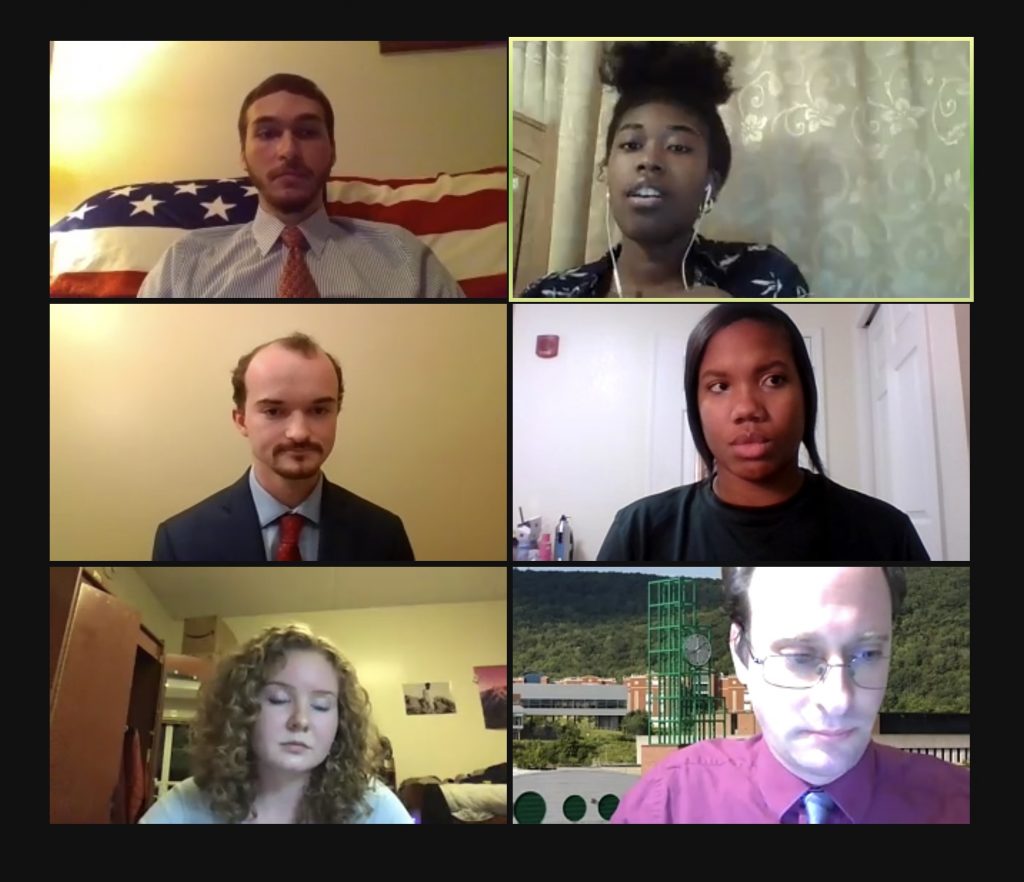While under federal investigation by the U.S. Department of Education, Binghamton University’s values of free speech have come under question.
On Thursday, various organizations at BU responded to criticism regarding the suppression of students’ freedom of speech by holding a virtual event called “Speech and Safety: A Roundtable Debate On Fostering Free Speech in the Campus Community.” The purpose of the event was to allow a group of politically diverse students to share their opinions and provide them with a platform in which they would be heard by their peers and BU faculty. The debate emphasized the importance of respect and community involvement.
The event was sponsored by BU Speech and Debate, the Scholars Program, the Center for Civic Engagement (CCE), the Multicultural Resource Center (MRC), Student Association (SA), SA vice president for multicultural affairs (VPMA) and the Graduate Student Organization (GSO) VPMA. The debate’s audience was made up of both current students and BU alumni.
The debate consisted of five politically diverse student speakers. Each speaker gave an opening statement and was given the opportunity for a rebuttal. Additionally, each speaker answered pointed questions from the student audience. The event was moderated and organized by Joseph Leeson-Schatz, director of Speech and Debate at BU.
According to Tyra Wilson, one of the event’s speakers and a junior majoring in English, there were two politically right-leaning panelists, two politically left-leaning panelists and one politically moderate panelist who participated in the debate.
“While we were not directly representing the groups we may be affiliated with, each of us are members of groups [or] organizations that more or less reflect our political viewpoints,” Wilson said.
The debate was guided by questions regarding the scope of freedom of speech, University guidelines regarding student safety and University-wide policies of respectability and accountability. The speakers referred to the Nov. 2019 student-led protests on campus. On Nov. 14, 2019, approximately 200 students protested the BU College Republicans’ and Turning Point USA’s tabling event in support of gun rights hours after a high school shooting in Santa Clarita, California. On Nov. 18, 2019, economist Arthur Laffer, who worked as an adviser to President Donald Trump and former President Ronald Reagan, was scheduled to speak at the BU College Republicans’ and Young America’s Foundation’s (YAF) “Trump, Tariffs, Trade Wars” event. Over 200 attendees at the lecture were part of a sit-in protest, which resulted in Laffer being removed from the lecture hall by Binghamton’s New York State University Police (UPD) and two hired protective agents from Pinkerton Consulting & Investigations, Inc.
Kate Marin, president of Speech and Debate and a sophomore double-majoring in integrative neuroscience and linguistics, emphasized the importance of starting the discussion of free speech on campus, stating that these discussions “should be an ongoing process but not the endpoint.”
“First, we intend to center a discussion of how we should relate to each other within a community of different opinions,” Marin said. “Second, we hope to cover why it is important to feel safe to speak freely in a campus environment. Third, we aim to discuss how essential it is for this project to occur in universities.”
Alison Twang, associate director of the CCE, added that the debate aimed to inform students and include them in an appropriate discourse..
“We would like students to come away from the event with new perspectives on how the ideals of free speech play out on a college campus,” Twang said. “Because this event is not structured as a traditional debate, the intention is not to have a winner or a loser but rather to expose students to ideas across the ideological spectrum.”
David Hatami, VPMA and a junior double-majoring in political science and business administration, said these discussions were “critical,” as they show the SA as well as BU faculty and administration what can be done to help “students to navigate these conversations.”
“I believe the event is important, for it will allow students with differing opinions to speak to one another in a respectable and safe setting,” Hatami said. “With this, students will be able to reach common ground and, if not, understand the varying opinions of their peers and neighbors.”
Logan Blakeslee, one of the event’s speakers and a junior majoring in history, said he felt that the panel was politically skewed.
“I somewhat feel like there was an imbalance that favored the left,” Blakeslee said. “However, I do not mind as it is reflective of the political leanings of the student body. I was given plenty of time to make my case, and that is what matters to me.”
Asher Simonson, a sophomore majoring in English, said he felt the conversation was productive.
“Every member spoke intelligently and thoughtfully,” Simonson said. “They covered quite a lot of ground, addressing questions from the crowd as well.”
Sophie Roth, a sophomore majoring in biology, said she attended the debate in order to gain insight into how to handle political discourse regarding free speech on campus.
“I went to the debate in order to learn about the ways in which students on campus view free speech,” Roth said. “I was interested to hear the opposing points of view and to learn about what my peers thought should be done in order to improve and encourage conversations on campus.”



